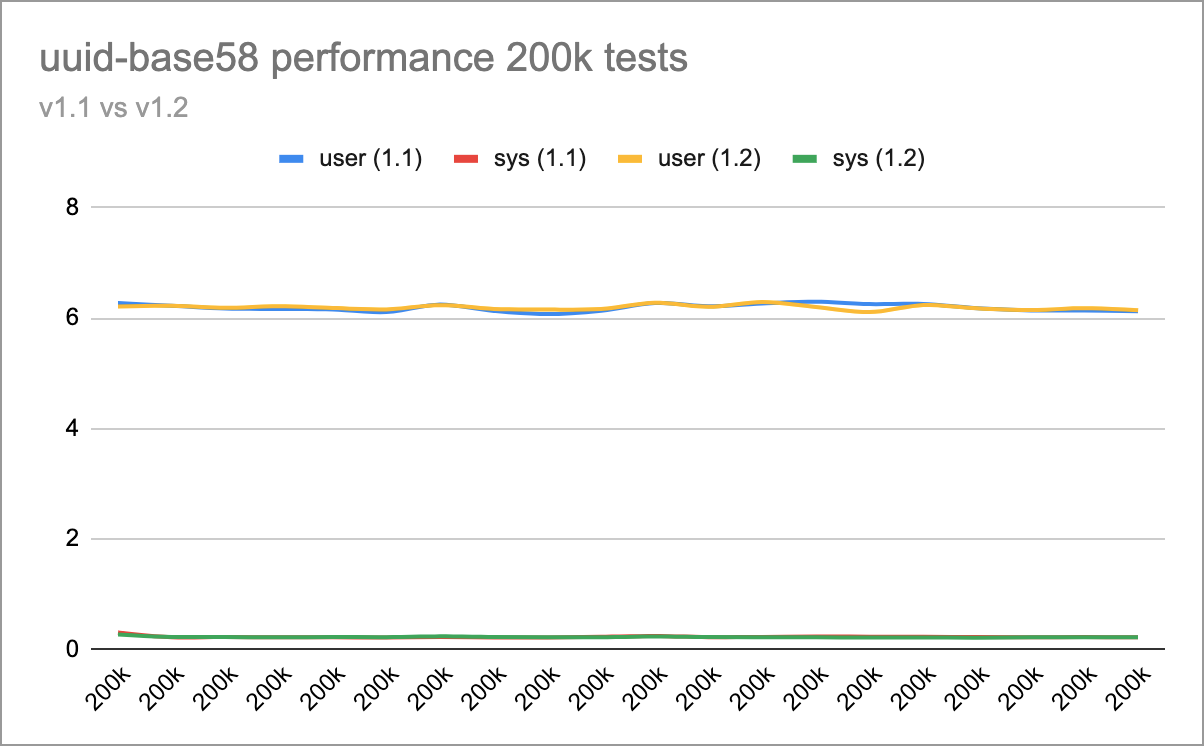Generate a RFC4122 compliant v4 UUID and return it encoded in base-58. This is great for creating unique IDs which only consume 22 characters of storage (some encodes are 21 characters). Also library also provides base-58 encoding, decoding and validation.
npm install uuid-base58import { uuid58 } from 'uuid-base58';
const id = uuid58();import { strict as assert } from 'assert';
import { uuid58, valid } from 'uuid-base58';
const id = uuid58();
assert(valid(id)); // trueThe uuid58 package provides the following functions:
uuid58- creates the RFC4122 v4 UUID encoded in base-58encode(string)- encodes a base-16 string in base-58decode(string)- decodes a string from base-58 to base-16valid(string)- returns true if the string is a valid base-58 stringuuidV4NoDash()- creates a RFC4122 v4 UUID without dashes
The validation is optimistic such that if the encoding will decode into a valid UUID it will return true. The validation will return false if the representative number overflows 128bits or if the base58 number is zero (0). A UUID-based base58 value of 1 is a valid UUID of 00000000-0000-0000-0000-000000000000 and a base58 value of 2 is 00000000-0000-0000-0000-000000000001. These are valid base58 values that can become valid UUIDs. The valid() function will also return false if a character in the base58 is not supported in the encoding hash alphabet which does not include l or 0 as an example.
npm run testThere is finite performance cost to translate a v4 UUID into base58. Testing the overhead for the translation to base58 exposes an additional 25% increase. Three quarters of the runtime was consumed calculating the v4 uuid. Additional work could be done to bring the uuid calculation internal and attempt to increase performance.
In version =>1.2 additional performance work was completed by removing the validation process from the v4 UUID calculation and the runtime from the amazing uuid project was lifted and placed into src/uuid of this project. The package reduction was significant: 340kB to 5kB (18kB unpacked). Unfortunately little to no substantial performance increase although it was noticed v1.2 did consistently score better in realtime results but user+system remained nearly the same over 4M test generations. Additionally, the UUID string management process was updated to not create a traditional dashed uuid and the uuid v4 validation process was removed (which addresses specific user input and does not intersect v4 calculation). Performance increases are likely at a point of diminishing returns.
For version >= 1.2.X the official dependency on the uuid project was removed. The solution and dependency are still in use but only the portion required for a v4 UUID was marshalled over. The runtime was altered slightly and added to the src/uuid path. Current sizing is around 5kB (18kB unpacked), down from 340kB.
This solution uses the Bitcoin / IPFS hash alphabet:
123456789ABCDEFGHJKLMNPQRSTUVWXYZabcdefghijkmnopqrstuvwxyz
Additional information on Base-58.
- CommonJS:
const { uuid58 } = require('uuid-base58') - ESM (Node/bundlers):
import { uuid58 } from 'uuid-base58' - Node versions: tested on Node 18/20/22; engines set to
>=14. - Browser: RNG prefers
globalThis.crypto.getRandomValues. If unavailable (very old browsers), a secure RNG is required and an error is thrown. Most modern browsers support Web Crypto.
CommonJS (Node):
// index.cjs
const { uuid58, encode, decode, valid, uuidV4NoDash } = require('uuid-base58');
const id = uuid58();
console.log('uuid58:', id);
console.log('valid:', valid(id));ESM (Node or bundlers):
// index.mjs or in a TypeScript file
import { uuid58, encode, decode, valid, uuidV4NoDash } from 'uuid-base58';
const id = uuid58();
console.log('uuid58:', id);
console.log('valid:', valid(id));Browser (with bundler):
// In a front-end app (Vite, Webpack, etc.)
import { uuid58 } from 'uuid-base58';
// Requires Web Crypto (available in modern browsers)
const id = uuid58();
document.body.textContent = id;See a runnable Vite example in examples/vite-basic.
Breaking Changes:
- Node.js 14+ required - upgrade Node.js if using older versions
- Package exports enforced - only use documented import paths (
import { uuid58 } from 'uuid-base58')
Non-breaking:
- All API functions work identically
- CommonJS imports unchanged
- Enhanced browser compatibility
Twitter - @cbschuld
Yes, thank you! Please update the docs and tests and add your name to the package.json file.






